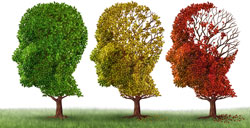Author: Lauren Robertson, BA, MPT
Contact hours: 6
AOTA CEUs: 0.6
Expiration date: December 31, 2026
Course price: $29*
*Register or login when you reach the last chapter.
Course Summary
This course will increase your awareness and understanding of Alzheimer’s disease and related disorders. The first section defines dementia, describes how dementia affects the brain, and discusses how the symptoms of dementia differ from normal age-related changes. The second section discusses the stages of dementia along with symptoms and behaviors you might see during these stages. The last section describes communication challenges at the different stages of dementia and provides tips for communicating with people at those different stages.
Target Audience
Nurses, nurse practitioners, advanced practice nurses, physical therapists, physical therapy assistants, occupational therapists and occupational therapy assistants*.
*If you are an OT or OTA, you may need the following information for relicensure:
![]() ATrain Education is an AOTA Approved Provider of professional development. Approved provider #6558. This distance learning-independent is offered at 0.6 CEUs, introductory, Foundational Knowledge. The assignment of AOTA CEUs does not imply endorsement of specific course content, products, or clinical procedures by AOTA.
ATrain Education is an AOTA Approved Provider of professional development. Approved provider #6558. This distance learning-independent is offered at 0.6 CEUs, introductory, Foundational Knowledge. The assignment of AOTA CEUs does not imply endorsement of specific course content, products, or clinical procedures by AOTA.
Criteria for Successful Completion
Study the course material, achieve a score of 80% or higher on the post test (the post test can be repeated if a learner scores less than 80%), complete the course evaluation, and pay where required. No partial credit will be awarded.
Accreditations
To find specific accreditations or approvals, click here.
Conflict of Interest/Commercial Support Disclosure
The planners and authors of this learning activity have declared no conflicts of interest, vested interest, or financial relationship that may influence the content of this activity. All information is provided fairly and without bias.
ATrain Education, Inc. received no outside financial or commercial support in the preparation, presentation or implementation of this learning activity and has no affiliation with any company whose products or services are mentioned in this activity.
Course Objectives
When you finish this course you will be able to*:
- Describe three differences between Alzheimer’s dementia and non-Alzheimer’s dementia.
- State the three National Institute on Aging and the Alzheimer's Association stages of dementia.
- Identify three barriers that may contribute to a missed or delayed diagnosis of dementia.
- In terms of onset, cause, and duration, distinguish among dementia, delirium, and depression.
- List three common behavioral and psychological symptoms of dementia.
- Identify five other common behaviors often attributed to dementia.
- Explain the action of the two main classes of medications prescribed for Alzheimer’s disease.
- State three ways in which dementia affects a person’s ability to complete activities of daily living.
- Describe three ways in which exercise appears to positively impact in people with dementia.
- Relate the three components that should be part of any activities program for anyone with dementia.
- Discuss three ways in which stress can affect a caregiver’s quality of life.
*Please note: attainment of course objectives will be assessed in the course evaluation.

